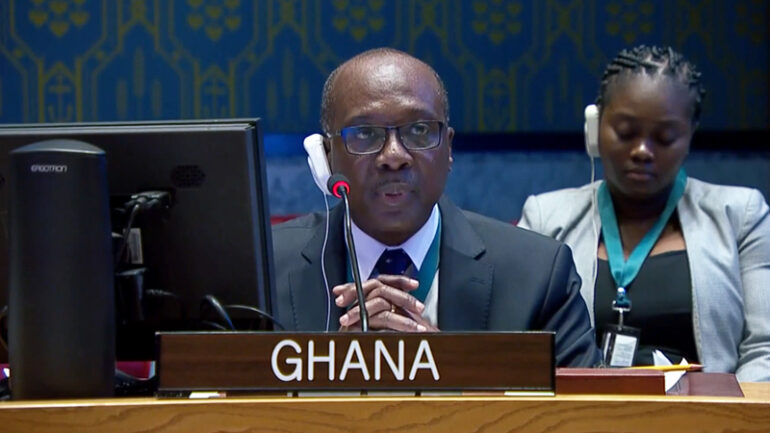Maintenance of international peace and security: Security Sector Reform

Mr. President,
I would like to begin by thanking Mozambique for convening this briefing on Security Sector Reforms. We believe the briefing is timely and would want to also thank the Assistant Secretary General at the Department of Peace Operations, Alexandre Zouev and the African Union Commissioner for Political Affairs, Peace and Security, Ambassador Bankole Adeoye, for their useful perspectives. We further appreciate the participation in this meeting of the Permanent Representatives of South Africa and Slovakia, the Co-chairs of the Group of Friends of Security Sector Reforms.
Mr. President
We take note, with appreciation, the Secretary-General’s March 2022 report and acknowledge the Council’s own useful contributions, made through resolutions 2151 (2014) and 2553 (2020) in converging a common understanding on the principles and expectations for security sector reforms, including inclusive national ownership, primacy of politics in SSR, and the need for a governance–focused approach. As a Council, we have on our agenda, several conflicts which are intra-State in nature, and also some that have relapsed after past efforts to resolve them. At the heart of the Council’s effectiveness in supporting sustainable peace in some of these conflicts settings should be an approach that centralizes security sector reforms to enhance the implementation of peace agreements between governments and armed groups, and contribute to the stability of fragile societies through the measures that are taken to rebalance State power, professionalize security institutions and law enforcement practices, protect the rights of all citizens and forge social cohesion among diverse national groups.
Mr. President,
In responding to the question as to what the Council can further do to ensure the inclusion of SSR in peace processes, it is necessary to underscore that the Council’s increasing role and involvement should not undermine the centrality of national ownership and leadership for peace efforts. Through its resolutions and mandates, the Council should reinforce the existing commitments of national actors and help unlock the resources required for advisory and technical assistance by national governments to undertake what is usually a difficult and sensitive reform. Also, we believe that the Council through its periodic consideration of the SSR agenda, could assess performance across different peace operations to understand practices that have yielded the best results and challenges that are unique. We also believe, in this regard, that further leverage could be mobilized by the Council from the Inter-Agency Security Sector Reform Task Force for a whole-of-UN approach for SSR, spanning the peace spectrum, including prevention, conflict resolution, peacekeeping, peace-building and sustainable peace and development. The Council’s encouragement for a whole-ofsociety approach towards security sector reforms is also especially useful in contexts where non-State institutions and establishments such as traditional and religious authorities play a prominent role in maintaining order, protecting societies and resolving disputes.
We would encourage the Council’s continuing interest in SSR even after a peace operation has transitioned, including through its engagement with the PBC and other relevant bodies that support the development of expertise and capacity at the national and local levels. Likewise, support for efforts that enhances trust and confidence between national authorities, national security actors and institutions, and the population, would be relevant including through the programmes of United Nations Country Teams. In this regard, we urge the maintenance of an inclusive process that benefits from the contributions of women and the youth. In reestablishing the norms of fragile societies around proper security sector management, it is important to be mindful that these are long-term commitments and that resources required for capacity building would need to endure beyond the immediate early years if we are to derive results that move such societies away from a negative and divisive orientation of political contestation and an oppressive security approach. Funding commitments in alignment with goal 16 of the SDGs would be a useful way to ensure sustainability to the commitment.
Madam President,
Before concluding, I would like to emphasise the important contribution and support that regional and sub-regional organisations such as the African Union can further make towards security sector reform and governance on the continent of Africa. The African Union through its Peace and Security Architecture and accompanying doctrines, the Governance Architecture, and the African Peer Review Mechanism can play an eminent role in reorienting the security sector of the countries of the continent in a manner that positively impacts on sustainable peace and development. We encourage dedicated resources to support such regional endeavours and sustained engagement by regional actors in this regard.
Finally, we wish to highlight the importance of applying lessons learned from past and ongoing security sector reform mandates to better inform future SSR mandates. The Council’s mandates for the promotion of national dialogue, enhancement of civilian oversight and public financial management in countries like Libya, Guinea-Bissau and Somalia; security sector governance, police reform, prison reform, defence sector reform in Central African Republic, Democratic Republic of the Congo and Libya as well as capacity building, establishment of national security coordination mechanisms in Democratic Republic of the Congo, Libya, Mali and Somalia, present essential elements for the Council’s future mandates.
I thank you for your kind attention.
